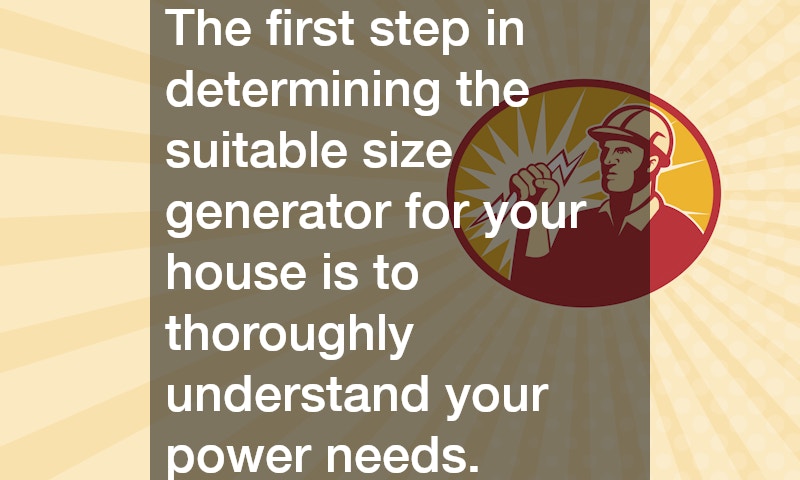Choosing the right generator for your home can be a daunting task. It’s important to make sure the generator you select can meet your household’s power requirements, especially during outages. This article will guide you through the steps needed to determine the appropriate size generator, ensuring that you invest in the right house generator to suit your needs.
Understanding Your Power Needs
The first step in determining the suitable size generator for your house is to thoroughly understand your power needs. Start by listing all the essential appliances and electronics that you would want to keep functioning during a power outage.
Consider items like refrigerators, lights, and perhaps heating or cooling systems that are crucial for your daily living.
Once you have a list, check the wattage requirements for each of these appliances. Most devices have a label indicating their power consumption, either in watts or amps and volts. Remember that some appliances, particularly those with motors, require more power upon startup, which can influence your calculations.
Adding up these numbers will give you a rough estimate of your household’s power needs during an outage. It’s essential to consider both the running watts and the starting watts to avoid underestimating your requirements. Some people find it helpful to use online calculators, which often take these factors into account and simplify the entire process.
Selecting the Right Generator Size
After obtaining a clear picture of your power requirements, the next step is to select a house generator that can handle this load. Generators are generally rated in terms of the maximum watts they can produce, so match this figure with your calculated power needs. Be sure to remember the distinction between running watts and starting watts, as neglecting this may lead to performance issues.
It’s prudent to select a generator that offers slightly more wattage than your calculated needs. This ensures that you have some buffer room for additional devices or unforeseeable power spikes without overloading the generator. This buffer is particularly important if you plan on adding more electronics or appliances in the future.
Moreover, keep in mind that different types of generators cater to different needs: portable generators can be ideal for temporary and low-power requirements, while standby generators offer a more permanent and powerful solution. The choice between these options should be guided by your lifestyle, budget, and specific power needs.
Considerations for Installation and Maintenance
Once you have selected the appropriate generator size, plan for its installation. Installing a generator, especially a standby one, might require professional help to ensure proper setup and safety compliance. It’s crucial to consider the location where the generator will be installed, as it should be safe from the elements while remaining accessible for maintenance.
Regular maintenance is key to ensuring the longevity and proper functioning of your generator. Establish a maintenance schedule that includes tasks like oil changes, spark plug replacements, and fuel inspections. Keeping up with maintenance tasks not only increases the reliability of your generator but also prolongs its lifespan, saving you costs in the long run.
When considering maintenance, also factor in the availability of replacement parts and local service providers. Having these resources readily available simplifies any repair process and ensures you won’t be left without power during an outage. A well-maintained house generator is an invaluable asset during emergencies, providing peace of mind and security.
Budget and Additional Features
Your budget is a crucial factor in determining the generator you ultimately purchase. Generally, larger generators with more substantial wattage capacities are more expensive upfront. However, investing in a reliable and appropriately sized generator can save you money by preventing the costs associated with frequent breakdowns and overloading.
Consider also the additional features that may come with the generator. Features like automatic start, fuel efficiency, noise reduction, and remote monitoring can enhance the usability and convenience of your generator. Evaluate which features are essential to you based on your lifestyle and preferences.
Moreover, be aware of any government incentives or programs that may be available to assist with the purchase of eco-friendly generators. These programs can significantly offset costs and make high-quality generators more affordable. Carefully weighing your needs against the available options will help you make a well-informed decision, ensuring your home is well-equipped during power outages.
Determining the right size generator for your home involves careful assessment of your power needs, appropriate selection of generator size, and considerations for installation, maintenance, and budgeting. By taking the time to evaluate each of these aspects, you can confidently choose a house generator that provides reliable power during outages. A well-chosen generator offers peace of mind and ensures your home’s essential functions remain uninterrupted, no matter the circumstances.
Whether you opt for a portable or standby generator, your decision should be informed by a comprehensive understanding of your requirements and available resources. As you continue down the path to acquiring the right house generator, keep these guidelines in mind to simplify the selection process. Ultimately, a properly sized generator can transform power outages from an inconvenience into a minor blip in your daily routine.
Investing the time to research and consult professionals as needed can lead to a satisfying purchase that serves your household efficiently. A reliable house generator not only protects your investments in essential appliances but also ensures your family’s safety and comfort during power interruptions. With the right preparation and knowledge, you can effectively manage power needs and maintain normalcy in any situation.

